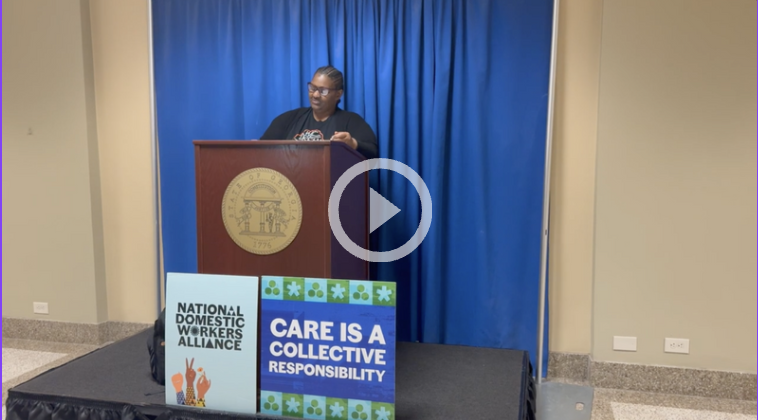FOR IMMEDIATE RELEASE: March 7, 2024
CONTACT: Daniela Perez, dperez@domesticworkers.org
Georgia Care Workers and Advocates Call for Historic Investments and Living Wages in Home and Community-Based Services
During a press conference in Atlanta, care workers and advocates from the National Domestic Workers Alliance, Atlanta-North Georgia Labor Council (AFL-CIO), New Disabled South, Georgia Budget and Policy Institute, and the Georgia House of Representatives urged enhanced funding for Georgia’s Home and Community-Based Services (HCBS) to facilitate direct wage increases for care workers.

The entire press conference can be watched on YouTube.
ATLANTA – On Wednesday, March 6, a coalition of Georgia’s labor and disability advocates gathered to demand increased investment in Medicaid’s Home and Community-Based Services (HCBS), underscoring the urgent need for historic and sustained funding. The press conference, convened by the National Domestic Workers Alliance (NDWA), Atlanta-North Georgia Labor Council (AFL-CIO), New Disabled South, members of the State House of Representatives, and care workers from the NDWA We Dream in Black Georgia (WeDiB) chapter, highlighted the critical role of direct care workers in supporting the state’s aging and disabled populations and their increased demand for living wages.
Patricia Lockette, Lead Georgia Chapter Organizer at the National Domestic Workers Alliance, opened the conference, emphasizing domestic workers’ longstanding struggle for fair compensation and dignity, tracing their efforts back to the 1881 washerwoman strike in Atlanta. “Domestic workers have been at the forefront of the labor movement in Atlanta since the 1881 Atlanta Washerwomen Strike—today, almost 150 years later, domestic workers continue to seek fair compensation for essential care work, echoing the historic struggle for dignity and respect,” Lockette stated.
The conference shed light on the dire situation facing Georgia’s HCBS system, including the unacceptable wages of direct care workers, who currently earn as little as $10 per hour, and the over 7,000 Georgians on waiting lists for critical services. “Raising wages is not just about parity; it’s about ensuring that we can meet the growing demand for care and support, the dignity of workers, and those they serve—which overall helps Georgia’s economy and workforce,” Lockette added.
Additional speakers at the event included Jacqueline Lamar, a care worker and member of NDWA WeDiB Georgia; Dom Kelly, President of New Disabled South; Sandra Lee Williams, President of the Atlanta Labor Council (AFL-CIO); State Representative Dr. Jasmine Clarke; and Leah Chan, Health Justice Director at the Georgia Budget and Policy Institute. Each underscored the importance of the proposed investments and legislative action to raise wages for HCBS workers.
Lamar, a care worker since 2016, shared that upon starting her career as a home care worker, she made $9 an hour as a misclassified independent contractor at an agency, never receiving a single raise throughout her three years of employment there. In addition to the low wages, she had to pay taxes at the beginning of each year, reducing her wages even further. Lamar shared how she struggles to afford to care for herself and her children, particularly her 11-year-old daughter.
In addition to Lamar’s experience with low wages as a care worker, she shared how the very care system she worked for affected her. “Two years ago, I had a stroke myself (at 39). I didn’t have the insurance, the resources, or a home health aide to help me recover. After three days in the hospital, they sent me back home in a rideshare,” Lamar shared. “I didn’t know how to walk or how to talk. My 9-year-old daughter at the time was my physical therapist.” Since her stroke, Lamar has struggled with accessing employment as a care worker, taking care of only a couple of patients a week, and making ends meet through gig work. As a trained Direct Service Professional, an HCBS wage increase would encourage her to re-enter the HCBS care workforce and finally receive wages that would allow her to afford the care she and her daughter need to thrive.
The collective call to action was clear: to endorse and mandate wage increases for direct care workers to ensure they receive fair compensation for their essential services. The advocates highlighted the pivotal moment Georgia faces in addressing the HCBS crisis. They urged the Georgia Legislature to act promptly to support the dignity of workers and those they care for.
The press conference marks a significant moment in Georgia’s ongoing dialogue about labor rights, disability justice, and the need for systemic change within the HCBS system. As the state confronts the challenges of an aging population and the aftermath of COVID-19, the united front of labor and disability advocates serves as a powerful voice for the thousands of direct care workers and those dependent on their services.
The Georgia HCBS campaign is part of a broader NDWA campaign to transform our care infrastructure by raising standards for the majorly Medicaid-funded direct care workforce and improving the quality of care for recipients. Our work to increase state and federal funding to Home and Community-Based Services aims to address workforce shortages by guaranteeing a significant portion of Medicaid funds to be directed towards increasing direct care worker wages while also using data collection mandates, rate studies, and other oversight tools to secure and raise future investment in HCBS. While our strategies focus on growing HCBS funding to allow more care recipients access to independence and critical care support and to create a stable workforce, we are also committed to enforcement work to realize higher standards for direct care workers and combat common issues in the industry.
###
National Domestic Workers Alliance (NDWA) is the leading voice for dignity and fairness for millions of domestic workers in the United States. Founded in 2007, NDWA works for respect, recognition and inclusion in labor protections for domestic workers, the majority of whom are immigrants and women of color. NDWA is powered by over 70 affiliate organizations and local chapters and by a growing membership base of nannies, house cleaners and care workers in over 20 states. Learn more at
www.domesticworkers.org. NDWA is a non-partisan non-profit organization that does not endorse, support, or oppose any candidates for public office.
![Georgia Care Workers and Advocates Call for Historic Investments and Living Wages in Home and Community-Based Services]()
![Georgia Care Workers and Advocates Call for Historic Investments and Living Wages in Home and Community-Based Services]()

